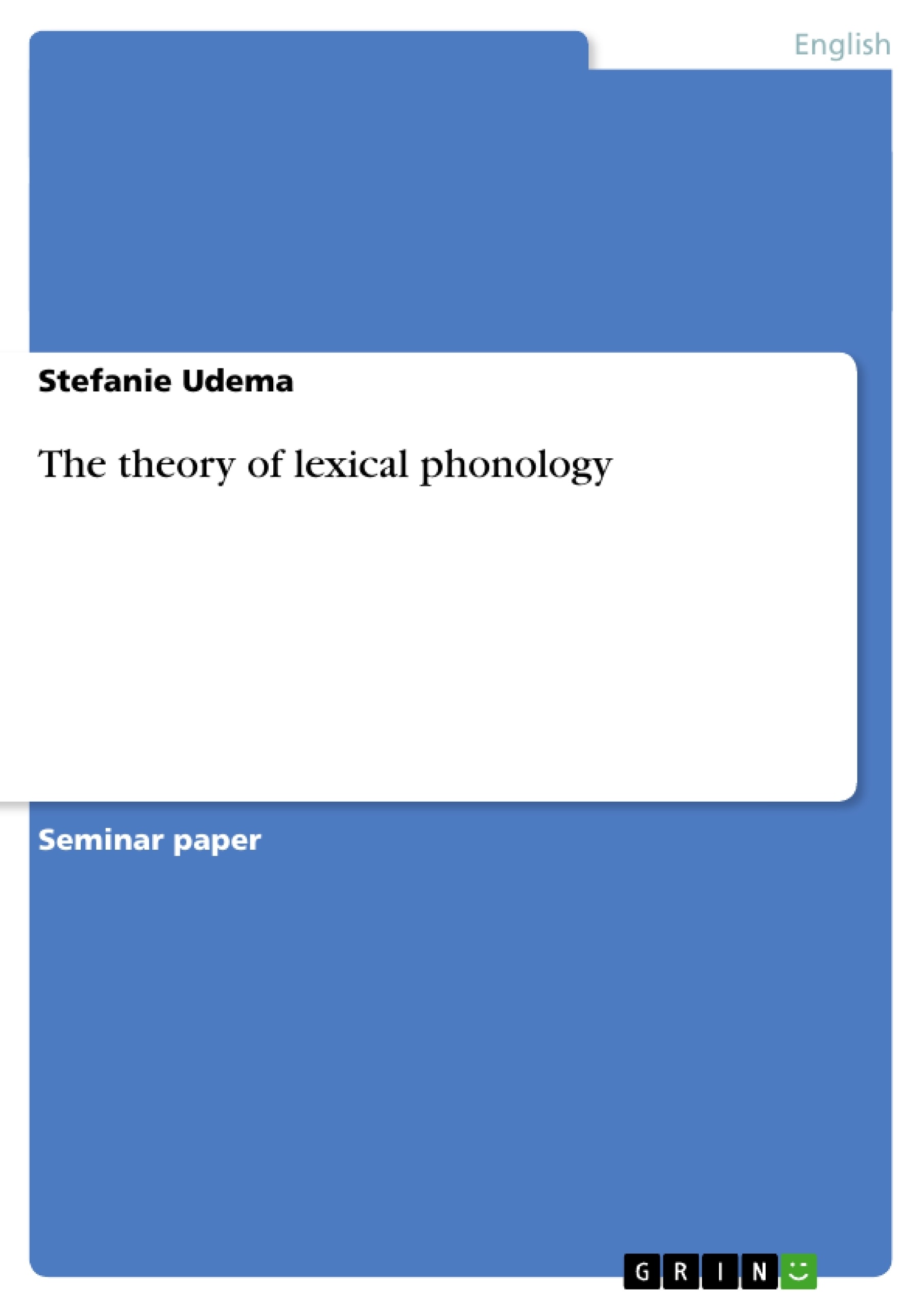The study of linguistics is a large branch of knowledge that deals with language and communication systems. Since a variety of linguists work on different interests concerning this science, there have been a lot of theories and models to describe specific approaches in human language. Since Chomsky and Halle’s Sound Pattern of English (1968), there are a number of further developments according to linguistics.
The theory of lexical phonology is one part of the study of linguistics which passes through several conceptions from the 1950s until today. Lexical phonology was developed in the early 1980s by K. P. Mohanan and P. Kiparsky and is the one most similar to classical generative phonology. In the theory of lexical phonology, the lexicon is given a key role and that represents a significant departure from classical models.
In the following paper an outlook is given of what is meant by the term lexical phonology, and also a historical background to achieve a general overview.
After having arranged the theory into linguistics and historical developments, there is a distinction between lexical and generative phonology. The relation between lexical phonology and morphology with its sharp distinction between lexical and postlexical rules, is presented afterwards. The interaction of phonology and morphology with the levels of representation will be explained to get to mechanisms of phonological changes and the output of phonology. For that reason, the information of the arrangement of affixes will be given. Different word formation processes such as vowel shift rule, vowel reduction, voicing or stress placement are mentioned to show the effect on what was elaborated before.
The aim of this paper is to give a general overview of the theory of lexical phonology with its classical roots rather than to go into very specific details.
Table of Contents
- Introduction
- The Study of Linguistics
- Lexical Phonology
- Historical Background
- Lexical Phonology and Generative Phonology
- Lexical Phonology and Morphology
- Lexical and Postlexical Rules
- The Order of Affixes
- Phonological Effects of Word Formation Processes
- Vowel Shift Rule
- Vowel Reduction
- Voicing
- Palatalization
- Velar Softening
- Spirantization
- Spirantization and Palatalization
Objectives and Key Themes
This paper provides a comprehensive overview of the theory of lexical phonology, tracing its historical development and highlighting its key features. The paper aims to shed light on the role of the lexicon in phonological processes, emphasizing the interplay between morphology and phonology.
- The historical development of lexical phonology and its relationship to classical generative phonology.
- The distinction between lexical and postlexical rules in the theory of lexical phonology.
- The role of the lexicon in word formation processes and the influence of morphology on phonological rules.
- The impact of phonological effects of word formation processes, including vowel shift, vowel reduction, voicing, and palatalization.
- The importance of understanding the theory of lexical phonology for a comprehensive understanding of linguistic structures.
Chapter Summaries
- Introduction: The introduction sets the stage for the discussion of lexical phonology. It highlights the significance of linguistics as a field of study and introduces the theory of lexical phonology as a prominent approach to understanding sound patterns and their interaction with word formation processes.
- The Study of Linguistics: This chapter explores the various branches of linguistics, emphasizing the importance of phonology in understanding language structures. It provides an overview of key concepts such as phonetics, morphology, syntax, semantics, and language acquisition.
- Lexical Phonology: This chapter delves into the theory of lexical phonology, emphasizing its development and its relationship to classical generative phonology. It highlights the central role of the lexicon in this theory, arguing that it plays a more active role than simply being an appendix to grammar.
- Historical Background: This chapter provides a detailed historical overview of the development of lexical phonology. It discusses the roots of the theory in generative phonology and the critiques that led to its evolution. It highlights the contributions of prominent linguists, such as Chomsky, Halle, Mohanan, and Kiparsky, in shaping the theory.
- Lexical Phonology and Generative Phonology: This chapter explores the relationship between lexical phonology and generative phonology. It examines the core principles of generative phonology and the reasons why it was deemed insufficient for tackling certain phonological problems. It also discusses the shift towards more formal analytic considerations in the 1970s and the key contributions of linguists like Goldsmith, Siegel, and Pulleyblank in restructuring generative phonology.
- Lexical Phonology and Morphology: This chapter examines the relationship between lexical phonology and morphology, emphasizing the crucial distinction between lexical and postlexical rules. It explores how these rules operate in word formation and the impact they have on phonological processes. It also examines the ordering of affixes and their influence on word formation.
- Phonological Effects of Word Formation Processes: This chapter delves into the various phonological effects of word formation processes, including vowel shift, vowel reduction, voicing, palatalization, velar softening, spirantization, and the interaction between spirantization and palatalization. It discusses the specific changes these processes bring about and their impact on the overall phonological structure of words.
Keywords
The key terms and concepts explored in this paper are lexical phonology, generative phonology, morphology, phonology, word formation, lexical rules, postlexical rules, affixes, vowel shift, vowel reduction, voicing, palatalization, velar softening, and spirantization. These terms are essential for understanding the fundamental principles of lexical phonology and its impact on the study of language.
- Citar trabajo
- Stefanie Udema (Autor), 2004, The theory of lexical phonology, Múnich, GRIN Verlag, https://www.grin.com/document/79441




